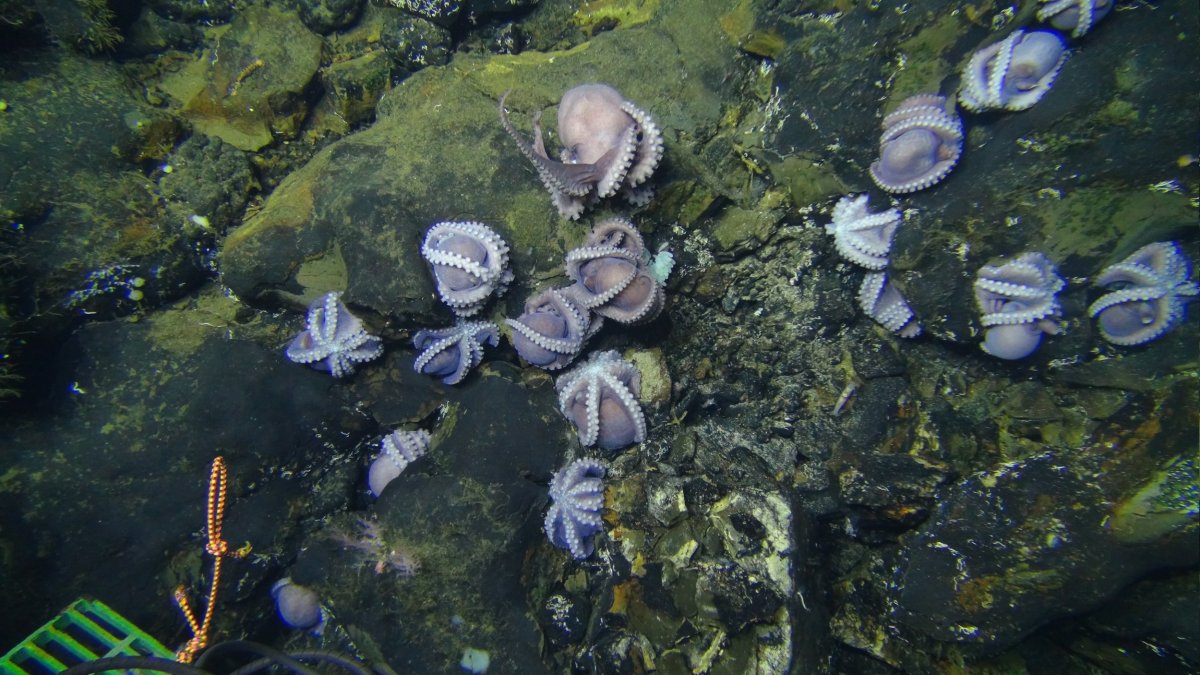Update| When there's no real estate in the safe part of town, you might just have to try to make it in the dangerous part. This philosophy is not lost on octopuses, who move to dangerous areas at the risk of losing their babies.
Scientists at The Field Museum, the University of Akron and the University of Alaska Fairbanks have discovered hundreds of unidentified pink octopuses, and yes, that is the correct plural, at a hot undersea rock crack near Costa Rica. They had sought shelter there to lay their eggs, but at some point the warm currents became unbearable. The scientists could tell that the animals were stressed, and it didn't appear that any of the embryos in their eggs had developed at all.

Normally, octopuses find nice, cool cracks to stay in while brooding. Living in such an overheated trench is so dangerous that scientists involved are shocked by this apparently suicidal behavior. It's even more shocking that they would find so many in the same area doing the same thing.
"Never in my wildest imagination did I ever imagine finding something like this," Janet Voight, associate curator of zoology at the Field Museum, told Newsweek. "Two miles [down,] that is so much deeper than one would expect a whole bunch of octopuses. Maybe a handful, it's toward the end of their depth range as far as we know, but to see so many in such a small area? It just blew me away."
Voight is one of the authors on a paper documenting the discovery, which was published in the April edition of the journal Deep Sea Research Part 1. Scientists had sent sub-sea vehicles to Dorado Outcrop, which is west of Costa Rica, in 2013 and 2014. Voight says she and one of the other researchers, Annie Hartwell, binge-watched the 231 hours of material that the vehicles obtained of the deep sea area.
"It sounds fun, but after 24 hours it gets tiresome," she said. "You're afraid even if you blink you'll miss something."
They noticed hundreds of octopuses in a deep, hot crevice, breathing heavily, indicating stress, which Voight says is so severe it could be lethal. "Their respiration rate doubled," she said. "Octopuses can only breathe twice their normal rate." Because of the low oxygen and physiological stress of unnaturally high temperatures, they had to pant like a dog in the sun.
Most octopus moms die after spawning anyway, but being unable to brood properly makes it hard for their eggs to hatch. The hot temperatures were likely also affecting the eggs.
There is a possible explanation for animals choosing to brood in treacherous waters. Crevices and cracks in rocks are like nurseries for octopuses; they naturally seek them to lay and hatch their young. There were more hospitable crevices nearby with cooler water, but it's possible that other octopus moms had already staked their claim in those areas, the paper suggests. Too many tenants and not enough flats in the nice part of town means that aspiring residents have to move into shabbier digs.
This article has been updated with information about octopus respiration.
Uncommon Knowledge
Newsweek is committed to challenging conventional wisdom and finding connections in the search for common ground.
Newsweek is committed to challenging conventional wisdom and finding connections in the search for common ground.
About the writer
Kristin is a science journalist in New York who has lived in DC, Boston, LA, and the SF Bay Area. ... Read more
To read how Newsweek uses AI as a newsroom tool, Click here.








